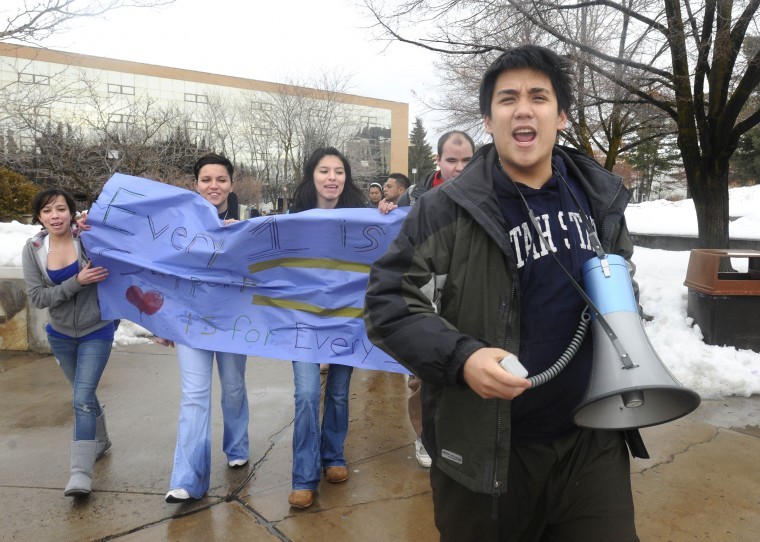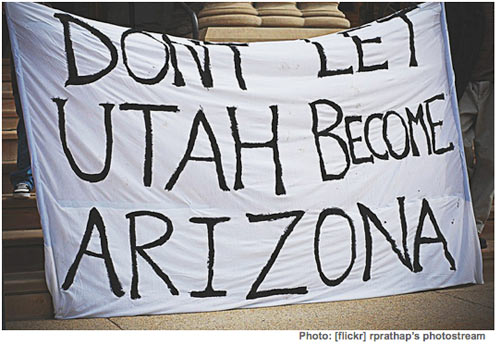Debate continues over ‘Utah Solution’ to immigration issue
April 30th, 2011 Posted in OpinionBy Heidi Hansen
LOGAN—While many are calling for the U.S. attorney general to sue Utah over its new state guest-worker program, others are looking at the “Utah Solution” as a model for national immigration reform, sparking another round in the immigration debate.
“Utah should not be punished. Rather we should be applauded for passing good public policy,” said Justin Hinh, president of the USU College Libertarians. “Utah’s immigration package has the best of both worlds. We increase enforcement but we also allow a route to citizenship.”
 Prompted by federal inaction to produce comprehensive immigration reform and the humane principles of the Utah Compact created a partnership of the Church of Jesus Christ of Latter-day Saints and several other Utah churches and businesses, the Utah Legislature passed a package of immigration reform bills this spring.
Prompted by federal inaction to produce comprehensive immigration reform and the humane principles of the Utah Compact created a partnership of the Church of Jesus Christ of Latter-day Saints and several other Utah churches and businesses, the Utah Legislature passed a package of immigration reform bills this spring.
The package, which is set to go into effect in 2013 if it receives a waiver from the federal government, includes HB116, creating a guest worker program for the state. Two other bills (HB497, HB469) are also included, calling for a lighter version of the Arizona-style enforcement policy and a way for Utah citizens to sponsor immigrants for work or study in the state.
The Arizona illegal immigration law, which the state adopted a year ago, drew fire as the toughest such law in the nation, with its provisions for racial profiling by police to identify, prosecute and deport illegal aliens. The law, critics say, impinges on federal law.
“The Utah Solution is better than the alternative of doing nothing and waiting on the federal government to act,” said Terry Camp, chairman of the USU College Republicans.
“Immigration is typically a federal issue,” said Hinh, who led a campus rally in March in support of the guest worker program, “but if the federal government fails in its responsibilities…the states are justified in stepping up to take on those responsibilities.”
While Camp concedes that HB116 is unconstitutional, because immigration issues fall under federal jurisdiction, he said that by seeking a waiver to implement the program, it seems Utah hopes to work with the federal government on practical solutions.
Because the bills passed by the Utah Legislature are currently unconstitutional and provide police officers with the power to check the immigration status of those being detained, many say they continue to support the Utah Compact, but not Utah’s specific solution.
The National Council of La Raza, a national Hispanic advocacy group, encourages other states to look at the Utah Compact for guidance, but not to copy Utah’s laws. Salt Lake City Police Chief Chris Burbank also supports the Utah Compact, but disagrees with the new legislation because it has negative consequences for law enforcement.
Camp said he doesn’t agree with all aspects of the Utah immigration package either, but does support the guest-worker program. “The real benefit it provides is giving a two-year temporary work permit after paying $2,500 fine,” he said, adding that this provides a legal means for immigrants to work in Utah.
The “Utah Solution”—specifically the guest-worker program, which some have mistakenly called an amnesty program—has become the source of controversial debate at the federal and state level, but opinions don’t seem to be falling along typical party lines.
 Utah Sen. Mike Lee and Rep. Jason Chaffetz have denounced the law, saying there’s no way the federal government would grant a waiver because immigration falls under federal jurisdiction.
Utah Sen. Mike Lee and Rep. Jason Chaffetz have denounced the law, saying there’s no way the federal government would grant a waiver because immigration falls under federal jurisdiction.
Instead, the Utah GOP leaders who voted for the guest-worker program have found favor with President Barack Obama, who met last week with Cabinet members and other officials to discuss possible federal immigration reform modeled after Utah’s approach.
“I believe this is the sort of immigration policy he [Obama] wants on the national level,” said Hinh, 19, a dual major in political science and economics. “Having a conservative state as an example will really bolster his point.”
Last year, when Arizona tried to take immigration law into their own hands and passed a very strict enforcement-only bill, the U.S. Department of Justice sued the state for usurping federal power.
Rep. Lamar Smith, R-Texas, wrote a letter to U.S. Attorney General Eric Holder demanding that he sue Utah over its guest-worker program, saying that not doing so would be hypocritical in light of the federal government’s stance on the Arizona law.
Utah Gov. Garry Herbert and Attorney General Mark Shurtleff are now pleading with the federal government to extend a waiver instead of suing the state over its immigration laws. Herbert has said it would make more sense for the federal government to focus on coming up with a solution to the immigration problem, rather than putting it off for another two years while they sue Utah.
“I understand why people are asking the federal government to sue Utah over HB116,” Camp said. “However, I think Utah should fight for our right to lead out where the federal government has failed…. It sued Arizona for going too far and it would sue Utah for being far too reasonable?”
It’s still unclear what will happen to Utah’s new immigration laws. What is clear is that people are thinking about the issues and trying to address them. Utah and the Obama administration seem to be slowly moving away from the rhetoric of fear and are now asking what can be done about the immigration issue.
USU Political Science Professor Michael Lyons offered advice for future immigration policy. He likened attempts to stop the flow of immigration to Prohibition attempts in the early 20th century. He said people wanted alcohol, so they found a way to get it. The same is true for immigrants seeking to enter the U.S.—they will find away.
“If there’s an incentive, if people want things, it’s hard for the government to control,” Lyons said. “Any realistic immigration policy needs to take that into account.”
From a historical prospective, he pointed out, immigrants have strengthened the U.S. economy, diversified U.S. culture and helped the U.S. gain international respect.
TP
Tags: HB116, Justin Hinh, Terry Camp, Utah immigration law

Sorry, comments for this entry are closed at this time.